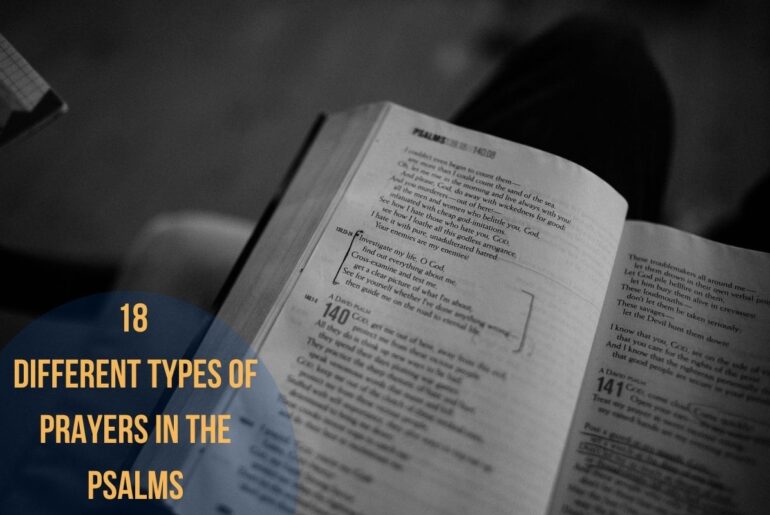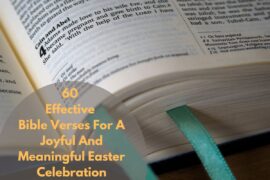The book of Psalms in the Bible is a rich collection of prayers and hymns that have been cherished by believers for centuries.
It offers a glimpse into the diverse range of human emotions and experiences, providing solace, guidance, and inspiration.
In this article, we will explore the Different Types Of Prayers In The Psalms and their significance in the lives of believers.
Contents
1. Introduction: Different Types Of Prayers In The Psalms
The Psalms, often attributed to King David, are a collection of 150 poetic compositions that express the deepest longings, joys, sorrows, and praises of the human heart. They serve as a spiritual guide, offering comfort and encouragement to individuals in various circumstances.
2. Understanding the Psalms
Before delving into the different types of prayers in the Psalms, it is important to understand the context and purpose of this biblical book. The Psalms are not merely a random assortment of poems but rather a carefully curated collection that reflects the relationship between God and His people.
3. The Importance of Prayer
Prayer is a fundamental aspect of the human experience and plays a vital role in the lives of believers. It is a means of communication with the divine, a way to express gratitude, seek guidance, find solace, and offer praise. The Psalms provide a framework for understanding and engaging in prayer.
4. Types of Prayers in the Psalms
4.1. Praise and Thanksgiving
Praise and thanksgiving are integral components of prayer. The Psalms are filled with expressions of adoration and gratitude towards God for His goodness, faithfulness, and mighty works.
4.2. Lament and Petition
In times of distress, the Psalms offer solace and a language to express sorrow, pain, and longing. They provide a safe space to pour out one’s heart before God and seek His intervention.
4.3. Confession and Repentance
The Psalms also serve as a guide for confession and repentance. They acknowledge human frailty, sinfulness, and the need for forgiveness. Through these prayers, believers can find restoration and renewal.
4.4. Intercession
Intercession is a form of prayer where believers intercede on behalf of others. The Psalms contain prayers for the well-being, deliverance, and protection of individuals, communities, and nations.
4.5. Wisdom and Guidance
Seeking wisdom and guidance is another aspect of prayer. The Psalms provide insights and prayers for discernment, understanding, and making righteous decisions.
4.6. Blessing and Dedication
The Psalms also include prayers of blessing and dedication. They express a desire for God’s favour, protection, and consecration of individuals, families, and communities.
4.7. Trust and Surrender
Trusting in God’s providence and surrendering to His will are essential aspects of prayer. The Psalms offer prayers that express reliance on God’s faithfulness, guidance, and sovereignty.
4.8. Gratitude and Contentment
Expressing gratitude and finding contentment in God’s provision and presence are themes found in the Psalms. These prayers remind believers to count their blessings and find joy in the Lord.
4.9. Hope and Assurance
The Psalms are filled with prayers that instill hope and provide assurance in times of uncertainty and despair. They remind believers of God’s promises and faithfulness.
4.10. Joy and Celebration
Celebrating God’s goodness, deliverance, and victories is an important aspect of prayer. The Psalms contain prayers of joy and celebration, expressing delight in God’s works.
4.11. Longing and Desire
Longing for God’s presence, yearning for His righteousness, and desiring deeper intimacy with Him are expressed in the Psalms. These prayers reflect the human thirst for spiritual fulfillment.
4.12. Anger and Imprecation
The Psalms also contain prayers that express anger, frustration, and a desire for justice. While these prayers may seem harsh, they reflect the honest emotions and struggles of believers.
4.13. Reflection and Meditation
The Psalms provide a space for reflection and meditation. They invite believers to ponder God’s character, His Word, and the wonders of His creation.
4.14. Exultation and Adoration
Exultation and adoration are central to prayer. The Psalms overflow with prayers that exalt and adore God, acknowledging His greatness, majesty, and glory.
5. Examples of Prayers in the Psalms
Here are a few examples of prayers found in the Psalms:
- Psalm 23: A prayer of trust and provision
- Psalm 51: A prayer of confession and repentance
- Psalm 91: A prayer of protection and deliverance
- Psalm 139: A prayer of awe and surrender
6. The Power of Praying the Psalms
Praying the Psalms has transformative power in the lives of believers. It provides comfort, guidance, and a language to express the deepest longings of the heart. Through the Psalms, believers can find solace, strength, and a deeper connection with God.
7. Conclusion
The Psalms offer a diverse range of prayers that encompass the entirety of the human experience. They provide believers with a framework for expressing their deepest emotions, seeking God’s guidance, and finding solace in His presence. Whether in times of joy or sorrow, the Psalms serve as a timeless source of inspiration and comfort.
8. FAQs
Q1: Are the Psalms only for religious individuals?
A1: While the Psalms have a religious context, their themes and messages resonate with people from all walks of life. They offer comfort, guidance, and inspiration to anyone seeking solace and a deeper connection with the divine.
Q2: Can the Psalms be used as a form of meditation?
A2: Absolutely! The Psalms provide a rich source of reflection and meditation. They invite individuals to ponder God’s character, His Word, and the wonders of His creation.
Q3: How can I incorporate the Psalms into my daily prayer life?
A3: You can incorporate the Psalms into your daily prayer life by reading and meditating on a Psalm each day. Allow the words to guide your thoughts and emotions as you communicate with God.
Q4: Are there specific Psalms for different situations?
A4: Yes, the Psalms cover a wide range of human experiences and emotions. You can find Psalms that address specific situations such as grief, thanksgiving, guidance, and more.
Q5: Can the Psalms be sung as hymns?
A5: Yes, many of the Psalms were originally written as songs and were meant to be sung. They can be a beautiful way to worship and express one’s devotion to God.








